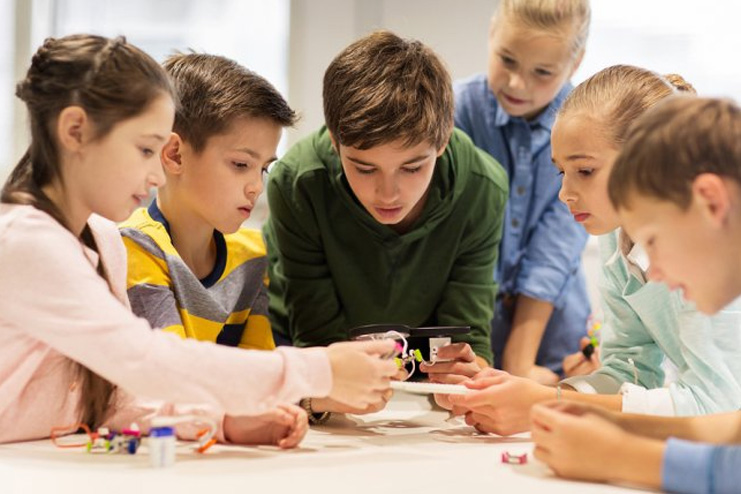Social skills are an integral part of everyone’s life which helps them to build up friendly interactions with the people around them. Almost everyone has these skills inside them but some of us may fail to put them in life due to various reasons ranging from being introverted to being shy.
Social skills are important for the children right from childhood to grow into a well-developed social being. They help children to develop many other good qualities including adaptability, empathy, and many more. Find out the benefits of social skills and how to teach them to the kids.
What Are Social Skills For Kids?

Social skills are the ones that we use in our everyday lives to interact with others either verbally or non-verbally using some gestures, body language and even facial expressions. Good behavior in social situations can help kids to develop good social skills. These skills help the kids join in interaction, collaborate with peers, develop lasting friendships, and even self-advocate when they need help.
Effective communication, conflict resolution, active listening, empathy, relationship management are the few examples of social skills.
Types of Social Skills:
Here are a few types of social skills that are identified in the literature:
A. Survival skills which include listening, ignoring, and following the directions
B. Interpersonal skills like sharing, joining a conversation, and taking the turns while talking
C. Problem solving skills that include seeking out for the help, decide what to do and what not to do, appropriate actions to take, and recognizing when to apologize.
D. Conflict resolution skills which deal with setting down the teasing, and bullying
Benefits of Social Skills:

Here are a few advantages that are associated with the good social skills:
1. Sharing:
Willingness to share the toys or the snacks can help the kids to make the new relations. Children between the age of three and six are likely to develop selfishness towards the things that especially come at a cost. For example, a kid with only one cookie may show the reluctance to share it with others as they already have the less to enjoy.
Children who feel good are likely to share the things with their peers. Children will get the feeling of wellness when they have the friendly interaction at the public spaces.
2. More relationships:
Good social skills can help the kids to develop the more friendly relationships. The kids who have more healthy and friendly relations are more secured and can easily find the ways to get out of the difficult situations. They can also help the kids to build the better outlook on their life and it can also bring the satisfaction in their life.
3. Brings brighter future for kids:
Good social skills also known to build up the bright future for the kids. Social and the emotional skills that the kids develop in their kindergarten can greatly predict their success in the adulthood. Children who develop the social and the emotional skills are likely to develop the substance abuse.
4. Helps kids to attain explaining, negotiating, and convincing skills:
These three skills are together called as the lawyer skills. They are vital for other types of works and experiences as well. This skills is very helpful for the kids to get out of the trouble.
5. Cooperating:
Cooperating meant to work together to achieve the common goal. Kids with the cooperating behavior are known to build up the respectful relationships. They learn to contribute, participate, and get the things done in a proper manner.
By the age of three years, children start to work with their peers for a common goal. Good communication skills are essential to get the things done successfully along with the community. This skill is very important for the kids when they grow up and supposed to work in groups.
Stages of Social Development In Your Child:
Development stages may not be the same with all the children. In general, most of the kids develop some social cues and social skills by these ages:
2-3 years, children at this age able to seek the attention from the other by using the different cues. They start to initiate the social interaction by saying the simple words like “HI”,”Bye” both verbally and physically. Kids start to laugh at the silly faces.
3-4 years, children at this age are able to take the turns while playing. They start playing with their doll or the stuffed animal as it is alive. You can notice the actual verbal communication at this stage.
4-5 years, could be able to develop the cooperation with their peers at this age. They start using the direct requests and are more to tattletale at this age.
5-6 years, at this stage child can distinguish between the good and bad words. They are aware of the pleasing words and the basic emotions like sad, happy, and angry.
6-7 years, kids at this age can understand and follow the instructions. They are able to listen to the others to tell their point of view and learn to take shifts and end the topics appropriately.
How To Teach Social Skills For Kids?

Teaching good social skills can help the kids to succeed socially, emotionally, personally, and academically. Kids are still growing, learning, and trying to make the connections.
Here are a few tips that you can help the kids develop social skills:
1. Join your kids in group classes:
Public education can do more than just making the people smart. One of the primary goal of the group classes is socialization. Socialization is a process where the kids learn to develop more comfortable social interactions. Group learning further help them to increase their network of the relationships.
2. Be a good model:
Want to make your child an active social person? Model them in yourself first. Because, it is not right to expect the things from your child at which you are not actually good. This is one of the best techniques to enhance social skills of a child. Children will be watching and trying to imitate us all the time. So it is more important to make sure what you are modeling is exactly the same as what you want them to boost up in the future.
3. Follow the interests of your child:
You can notice the amazing results when the children are interested with something that they are genuinely interested in. know the interests of your child and join them in clubs matching their interests. This is first step that parents should take while trying to implement the social skills with your kids. Starting with the other kids with the same interests is a good choice to socialize your kid.
4. Teach empathy to kids:
This is one of the best ways to improve a child social skills and relationship with peers. Kids who can understand the feelings of others are well known to stay connected with the other kids to form the positive bonds. Talking to the kids about different situation and scenarios will help to teach the empathy for your child. Ask your child to analyze how people will react and think under the influence of different situations. The mail goal of teaching empathy is to make children active listeners.
5. Make the eye contact a primary thing:
Encourage your child to look into the eyes while talking to somebody. This fosters their confidence and the effective communication. This practice need to be exercised daily by your toddler to master the proper social skills.
If they regret to look into the eyes of the people, ask them to talk to their soft toy by looking into its eye. This can help them soon to overcome their shyness.
6. Talk to your child about the emotions:
Explain your child various emotions and make them imitate each of the feeling. Here are a few emotions and feelings that you can make your child practice. This is one of the best approaches to enhance the child social development. Ask your child how they feel while eating, watching a movie or doing their favorite thing. Sit with your child in the evening and speak about what had happened in the school.
7. Offer your child opportunities to communicate:
Either verbal or non-verbal your children should learn to express their views and respond to the social stimulus. Teach your child some appropriate greeting and responses that work well in the social settings. Parents’ guidance is required for the children to overcome the shyness and express freely in the social settings. Let your child understand that they have the right to talk, express, question, communicate their desires and needs.
8. Let them spend time with the family:
Family setting is a great way to foster the social skills of your child. Let your child spend more time with the family by making them sit with you during the meal times, and involving them in some family events. Make your family time a fun experience for your kids. Don’t make it boring by teaching them discipline and morals all the time.
9. Make them ready for the higher social skills:
A child who knows how to communicate and express their thoughts and feelings without any shame or fear are known to be equipped with the techniques to face the challenges and tackle the situations that come their way while growing.
Let your child to work with the negotiation, and the conflict resolution which are the great platforms to experiment and learn the social skills.
10. Teach them courtesy:
Rude and aggressive behavior in the kids is not always the good and may restrict them in building the healthy relations. Help your kids to develop courtesy with the peers. Help your child to make their daily transactions more civil just by teaching them manners. Teach your child how to lend a helping hand.
11. Practice Role playing:
Role play is the active platform to teach kids social skills. Let your child practice this role play on their own with their stuffed toys. Keep an eye on your child while they are playing and this can help them to know what kind of qualities does your child has and how to bring them on track. Practice the role play with younger and the older children.
12. Know the limits of your child:
Some children are more active and more social than others. You should not expect that your introverted or shy child should behave the same way just like the naturally outgoing child. Know the comfortable setting for the interaction of your child. Some like the large social setting whereas the other kids like to enjoy being in the small social groups.
13. Teach your child to deal with the anger and frustration:
Mood swings are more common with the children just like the adults. Children should be equipped with the techniques that help them cope well with their anger and frustration. Teach kids to take the deep breaths or take some time to get back to the normal condition.
14. Practice think before speak strategy:
The words that spoke with the unconscious minds may make you lose some relations. The same thing happens with the kids as well. Teach kids to think for a while before they speak out a word. This can help to prevent your child from hurting others. Make kids to exercise this right from the home. This is one of the best skill that kids need in their life to build stronger and everlasting relations.
15. Teach them sharing:
Sharing come out of empathy. Sharing allows kids to make the new friends and this feature is good to go right from the toddlerhood. Talk to your child about sharing and make them exercise in the play dates. Other way to implement is give your toddler some cookies and ask them to keep one with them and distribute the rest to the other family members.
16. Feedback, encouragement, and praise play a role:
Encourage your child for trying to learn the new things. Provide them a feedback on what went well and what needs to be improved. Praise and encourage will help you to keep them in the track of learning while your feedback makes them to equip with the additional tools to achieve success in the future.
17. Teach your child good manners:
Good manners ranging from personal hygiene to greeting others will help the kids to become active at the social settings. Teach kids some personal hygiene including washing hands, grooming well, choosing the dress that matches their personality. Personal hygiene can keep up their self-confidence and self-esteem.
18. Practice self-care strategies:
Children who learn to take care of their own are get used to learn social skills to keep up their relations. Teach kids some self-care strategies like yoga, meditation, and exercise to model the fitness and handle the negative emotions. Allow children to practice these techniques everyday either with the group or on their own in the early morning.
19. Choose some educational apps:
While you take some rest, let the technology take its turn to teach your child some social skills which are very useful for them to move forward in the social settings.
Here are a few age specific educational apps to teach your child social skills:
● SuperBetter, which is equipped to turn the everyday actions into the video game objectives.
● Middle School Confidential, it is helpful for the children aged 8-14 years to tackle the lack of self-confidence with graphic and easy to navigate stories.
● The Social Express, this apps helps the children and teenagers to handle the social situations effectively by perceiving their emotions and feelings.
In conclusion, all the children are not same. Similarly the ways to teach the social skills to the kids may vary. Along with these approaches, kids need the assurance and support from their parents.









































